Devotions upon Emergent Occasions
Together with Death’s duel
존 던은 1623년 11월 후반부터 12월 초에 이르기까지 병명을 알 수 없는 병을 앓았다. 병에 걸린 동안 그는 육체적 고통에 따른 그의 영적인 반응을 메모했다가, 이것을 근거로 이 책을 썼다고 한다. 이후 헤밍웨이(E.M.Hemingway)가 그의 소설[누구를 위하여 종이 울리나?](For Whom the Bell Tolls)의 제목을 이 책의 한 구절을 인용하여 지으면서 책은 더욱 알려지게 되었다. 이 책의 구성은 총 23장으로 되어 있고, 각 장은 묵상(meditation), 논쟁(expostulation), 그리고 기도(prayer)의 3개의 하위 장으로 나뉘어 병자가 병의 매 단계마다 하나님께 예배드리는 형식을 취하고 있다. 묵상과 기도는 시어들이 많이 사용되는 반면에 논쟁은 산문의 경향이 짙다. 묵상은 병에 걸려서 회복되기까지의 육체적 변화를 당대의 의학, 천문학, 연금술, 우주론, 그리고 종교관에 근거하여 묵상한 내용을 담고 있다. 논쟁은 명상에서의 이미지들을 사용하여, 이해하기 어려운 성경의 내용을 하나님과 논의하는 형식으로 풀어나가는 방식을 취하고 있는데, 그의 병은 하나의 역사적 사건으로 성경의 내용들과 결합된다. 끝으로 기도에서는 하나님이 인간 세상에서 하나님의 존재를 어떻게 드러내 보여주는가를 밝히면서 하나님에 대한 찬양과 존 던 자신의 죄의 고백과 구원의 확신을 말한다.
I. Insultus morbi primus.
The first Alteration, the first Grudging, of the Sickness.
I. MEDITATION.
Variable, and therefore miserable condition of man! this minute I was well, and am ill, this minute. I am surprised with a sudden change, and alteration to worse, and can impute it to no cause, nor call it by any name. We study health, and we deliberate upon our meats, and drink, and air, and exercises, and we hew and we polish every stone that goes to that building; and so our health is a long and a regular work: but in a minute a cannon batters all, overthrows all, demolishes all; a sickness unprevented for all our diligence, unsuspected for all our curiosity; nay, undeserved, if we consider only disorder, summons us, seizes us, possesses us, destroys us in an instant. O miserable condition of man! which was not imprinted by God, who, as he is immortal himself, had put a coal, a beam of immortality into us, which we might have blown into a flame, but blew it out by our first sin; we beggared ourselves by hearkening after false riches, and infatuated ourselves by hearkening after false knowledge. So that now, we do not only die, but die upon the rack, die by the torment of sickness; nor that only, but are pre-afflicted, super-afflicted with these jealousies and suspicions and apprehensions of sickness, before we can call it a sickness: we are not sure we are ill; one hand asks the other by the pulse, and our eye asks our own urine how we do. O multiplied misery! we die, and cannot enjoy death, because we die in this torment of sickness; we are tormented with sickness, and cannot stay till the torment come, but pre-apprehensions and presages prophesy those torments which induce that death before either come; and our dissolution is conceived in these first changes, quickened in the sickness itself, and born in death, which bears date from these first changes. Is this the honour which man hath by being a little world, that he hath these earthquakes in himself, sudden shakings; these lightnings, sudden flashes; these thunders, sudden noises; these eclipses, sudden offuscations and darkening of his senses; these blazing stars, sudden fiery exhalations; these rivers of blood, sudden red waters? Is he a world to himself only therefore, that he hath enough in himself, not only to destroy and execute himself, but to presage that execution upon himself; to assist the sickness, to antedate the sickness, to make the sickness the more irremediable by sad apprehensions, and, as if he would make a fire the more vehement by sprinkling water upon the coals, so to wrap a hot fever in cold melancholy, lest[Pg 9] the fever alone should not destroy fast enough without this contribution, nor perfect the work (which is destruction) except we joined an artificial sickness of our own melancholy, to our natural, our unnatural fever. O perplexed discomposition, O riddling distemper, O miserable condition of man!
I. EXPOSTULATION.
If I were but mere dust and ashes I might speak unto the Lord, for the Lords hand made me of this dust, and the Lords hand shall re-collect these ashes; the Lords hand was the wheel upon which this vessel of clay was framed, and the Lords hand is the urn in which these ashes shall be preserved. I am the dust and the ashes of the temple of the Holy Ghost, and what marble is so precious? But I am more than dust and ashes: I am my best part, I am my soul. And being so, the breath of God, I may breathe back these pious expostulations to my God: My God, my God, why is not my soul as sensible as my body? Why hath not my soul these apprehensions, these presages, these changes, these antidates, these jealousies, these suspicions of a sin, as well as my body of a sickness? Why is there not always a pulse in my soul to beat at the approach of a temptation to sin? Why are there not always waters in mine eyes, to testify my spiritual sickness? I stand in the way of temptations, naturally, necessarily; all men do so; for there is a snake in every path, temptations in every vocation; but I go, I run, I fly into the ways of temptation which I might shun; nay, I break into houses where the plague is; I press into places of temptation, and tempt the devil himself, and solicit and importun



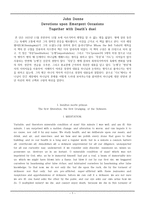
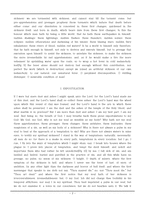
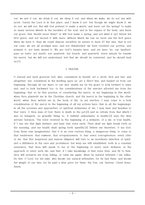
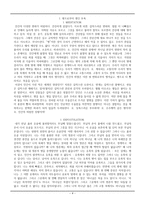
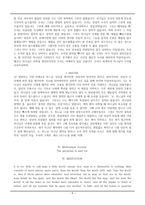
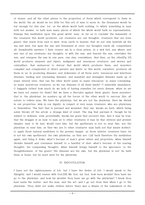
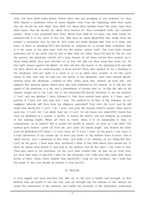
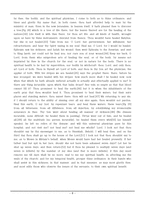
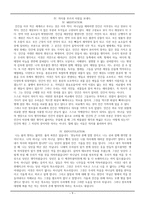
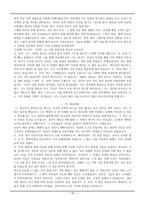
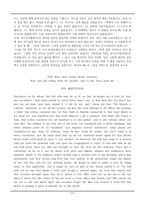
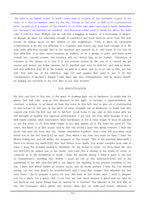
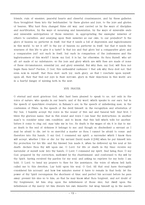
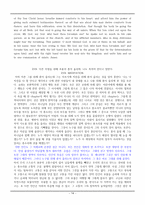
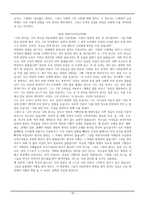
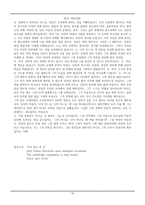
 분야
분야


